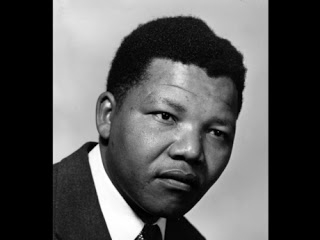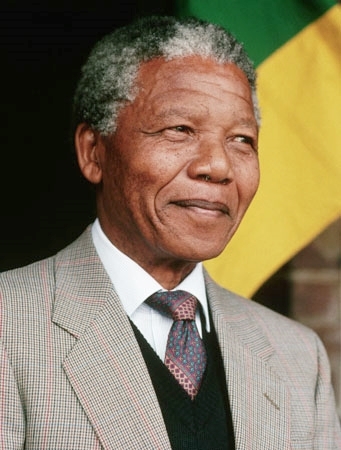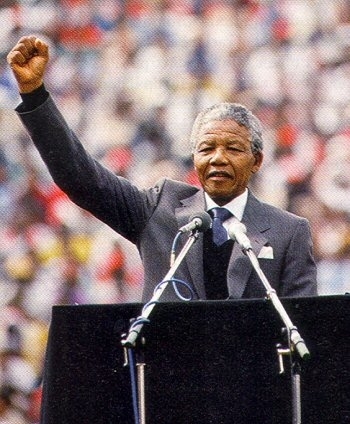 |
| Young Nelson Mandela (http://www.ablble.com/2011/08/nelson-mandela-young (ABLBLE Wiki)) |
"I learned that courage was not the absence of fear, but the triumph over it. The brave man is not he who does not feel afraid, but he who conquers that fear" (Mandela Quotes) This was a quote by Nelson Mandela, a humanitarian, a peacemaker, a leader. Nelson Mandela grew up in a time of segregation, when getting a job was dependent on the color of one's skin, where your traditional morals and standards are considered savage or primitive by the government. But like Mandela said in A Long Walk to Freedom; "I am getting ahead of myself" (Mandela Long Walk to Freedom).
Nelson Rolihlahla Mandela was born on July 18th, 1918 in Mvezo, a tiny village on the river banks of the Mbashe River, South Africa. He was born into the Thembu Royal House but wasn't given any sort of stature in the village. He was originally named Rolihlahla which colloquially meant 'troublemaker'. But Mandela once said that; "I do not believe that names are destiny" (Mandela Long Walk to Freedom). Mandela was a part of the Xhosa nation which was made up of many tribes and different types of people in South Africa. When Mandela was young he started to go to church every Sunday in his village. As a result, Christianity became a major part of his life. He attended Methodist Mission schools and while at mission school, Mandela learned English, history of the Xhosa, and geography. This influenced Mandela to want to learn more about African History. When he attended school, he was given his English name, Nelson. Mandela continued to advance in school and attended the universities Fort Hare University and University of Witwatersrand. At these schools he focused on law. He then moved to Johannesburg where he joined the African National Congress and became more involved in anti-apartheid activism. Mandela has spent the majority of his life trying to improve South Africa by creating campaigns, joining organizations, and speaking for the people against the apartheid movement. Through his dedication to his country, the strength he has gained through hardships, and the actions he took for his country, Nelson Mandela demonstrates the traits of a hero and is a benchmark of inspiration for people of South Africa and around the world.
 |
| President Mandela (http://www.nelsonmandelaonline.net/ (Nelson Mandela Online)) |
Nelson Mandela shows dedication to his country through continued support, devoting his time, and putting himself in the 'warzone'. After many years in office improving his country; "Mandela retired from active politics by the 1999 general election, but maintained a busy schedule, raising money for his Mandela Foundation to build schools and clinics in South Africa's rural heartland, and serving as a mediator in Burundi's civil war" (Mandela The Biography Channel). Nelson Mandela shows dedication to his country through continuously working to better his country, even after he served as president. He continues to fund his Mandela Foundation as well as helping fund clinics and schools in rural South Africa. Dedication isn't something that happens one time, Mandela is a perfect example of how dedication should continue through your job. He construes it to be more of a lifestyle or a daily routine than a job. He still manages to raise money for his foundations and played many factors in not just improving lives, but saving them. Through his actions, Mandela saved many lives by helping mediate a peaceful end to the Burundi civil war; even after stepping down as president he has influence over people. Nelson Mandela stated that; "During my lifetime I have dedicated myself to this struggle of the African people. I have fought against white domination, and I have fought against black domination. I have cherished the ideal of a democratic and free society in which all persons live together in harmony and with equal opportunities. It is an ideal which I hope to live for and to achieve. But if need be, it is an ideal for which I am prepared to die" (Mandela Quotes). Mandela has securely attached his life with his goals and hopes for South Africa. He is "prepared to die" for what he lives to achieve. That is true dedication. Mandela has "cherished the ideal of a democratic and free society" showing he is speaking about change for his people. Through his continuous dedication and engagement for his country, Mandela has shown dedication through personal interaction in South Africa's affairs.
Nelson Mandela has been jailed for protesting, threatened with death, and faced with many other hardships, but in the end he used those struggles to gain strength for himself, and his country. Nelson Mandela had been promoting peaceful protests when; "He orchestrated a three-day national workers strike in 1961 for which he was arrested in 1962. He was sentenced to five years in prison for the strike, and then brought to trial again in 1963. This time, he and 10 other ANC leaders were sentenced to life imprisonment for political offenses, including sabotage" (Mandela The Biography Channel ). Mandela was struggling to create peaceful protests and decided to start striking. He had assembled groups of people to go on strike, but he ended up being arrested for orchestrating the protest. This was one of Mandela's greatest struggles, but also where he gained strength. Soon after, Mandela was arrested and put into jail for wanting to help his country's racial equality struggle. He was released after 27 years and went on to become the first democratically elected president in South Africa. Nelson Mandela talks about his life struggles: "I have walked that long road to freedom. I have tried not to falter; I have made missteps along the way. But I have discovered the secret that after climbing a great hill, one only finds that there are many more hills to climb. I have taken a moment here to rest, to steal a view of the glorious vista that surrounds me, to look back on the distance I have come. But I can only rest for a moment, for with freedom come responsibilities, and I dare not linger, for my long walk is not ended" (Mandela Quote). Mandela outlines his life struggle and relates it to his achievements and accomplishments. He says how he has "walked that long road to freedom" symbolizing how he has had many struggles in his "walk to freedom". He goes on to talk about how far he has come, how he got where he was. He says "I have taken a moment here to rest, to steal a view of the glorious vista" portraying how he has looked back on his struggles to keep him moving forward. To show him how far he has come, and how much that is worth. Nelson Mandela went from a jail cell, to the presidential building. He went from struggling to gain supporters, to having the majority of the country by his side. After enduring his life hardships, Mandela has gained great respect from his people.
Nelson Mandela took action when no one else would, he created campaigns promoting non-violent actions, influencing the ANC, and fighting the apartheid movement. Mandela was working against the apartheid movement so; "He joined the African National Congress in 1944 and was engaged in resistance against the ruling National Party's apartheid policies after 1948" (Mandela Biography). The country of South Africa had been extremely influenced by the apartheid movement, which was a segregation system based on race. The Apartheid movement was enforced by the National Party of South Africa. The NPSA was created to establish and promote the Afrikaner culture which was a culture based on a group of Dutch, French, and German men and women with the beliefs of race classification and appearance. With the rising control of the Apartheid movement there were many organizations that arose, such as the ANC. The ANC was created to help "engage in resistance against the ruling National Party". Thus creating the Anti-Apartheid movement which Mandela was heavily involved in. Mandela was different, though everyone in ANC was supportive of the same movement, Mandela took it a step further and achieved more goals for the ANC. Mandela said to his people; "Let there be justice for all. Let there be peace for all. Let there be work, bread, water and salt for all. Let each know that for each the body, the mind and the soul have been freed to fulfill themselves" (Mandela Quotes). Mandela was very pro- South Africa. He spent all of his time trying to improve the quality of life of the South African people. Mandela took action for his country, when not many others would. Mandela desired "justice for all", he also wanted "peace for all". His people also wanted this. Mandela was different, he was the one who took action, he knew what his people needed so he took action for them. He helped his country achieve goals, he spoke for his people, and he took action for his people. Nelson Mandela took action for his country with a purpose of ending racism in a time when fighting for what is right was uncommon.
 |
| Nelson Mandela Speech (http://www.blackpast.org/?q=gah/mandela-nelson-rol (Adeleke Tunde, Iowa State University)) |
Nelson Mandela has demonstrated dedication, strength, and taking action throughout his term as president, as well as after he resigned. He has shown inspiration through the actions that he took. Mandela has given his time and life to his country, even after he resigned as president. He continues to give support to charities and organizations that he funds as well keeping the same beliefs he changed the country with. Mandela has gained strength through struggle, from the many places life took him, he overcame those struggles and took something out of them. South Africa was an oppressed country, where the apartheid movement had control of most daily life, Mandela was the voice of the people. Mandela took a stand when everyone else was sitting, he took action when no one else would against the apartheid movement. Nelson Mandela is an inspiration to me because of his commitment and dedication as well as his mental strength. Mandela did not have it easy, he was growing up during times of war, and a segregated nation, known back then as the apartheid movement. There were white and black separation, but it was clear they weren't equally 'segregated'. Mandela wanted to cut down and dismantle the apartheid movement as well as racism, and inequality as a whole. He started out with small groups of supporters, but through dedication and commitment he became the first democratically elected president of South Africa and had millions by his side. Mandela has struggled throughout his life but the payoff, the presidency, the millions of supporters, and the change he made was worth it. Without Nelson Mandela South Africa would be a different place. Mandela has persevered through many struggles, arrested for striking, gaining supporters, and dealing with the apartheid movement but has come out conquering those tedious complications. Nelson Mandela stood up when no one else would stand up, he put his country before himself. He led a country that was torn apart and managed to stitch it back together stronger than before. Mandela is not only a hero, he is an inspiration, a leader, Mandela is hope for the future.
Works Cited
Nelson Mandela." 2013. The Biography Channel website. Feb 05 2013, 10:0
"Nelson Mandela - Biography". Nobelprize.org. 6 Feb 2013
Mandela, Nelson. A Long Walk to Freedom. Boston, New York, London: Little, Brown and Company, October 1, 1995. Print
"Mandela, Nelson." International Encyclopedia of the Social Sciences. Ed. William A. Darity, Jr. 2nd ed. Vol. 4. Detroit: Macmillan Reference USA, 2008. 580-581. Gale Virtual Reference Library. Web. 5 Feb. 2013.
"Mandela, Nelson." UXL Encyclopedia of World Biography. Ed. Laura B. Tyle. Vol. 7. Detroit: UXL, 2003. 1216-1219. Gale Virtual Reference Library. Web. 5 Feb. 2013.
"Nelson Mandela Quotes." Nelson Mandela Quotes (Author of Long Walk to Freedom). Good Reads, 2013. Web. 05 Feb. 2013.
"Our Impact." ACTION.org. Action.org, 2012. Web. 05 Feb. 2013
Page created on 2/14/2013 12:00:00 AM
Last edited 2/14/2013 12:00:00 AM
A Long Walk to Freedom: The Autobiography of Nelson Mandela By Nelson Mandela
